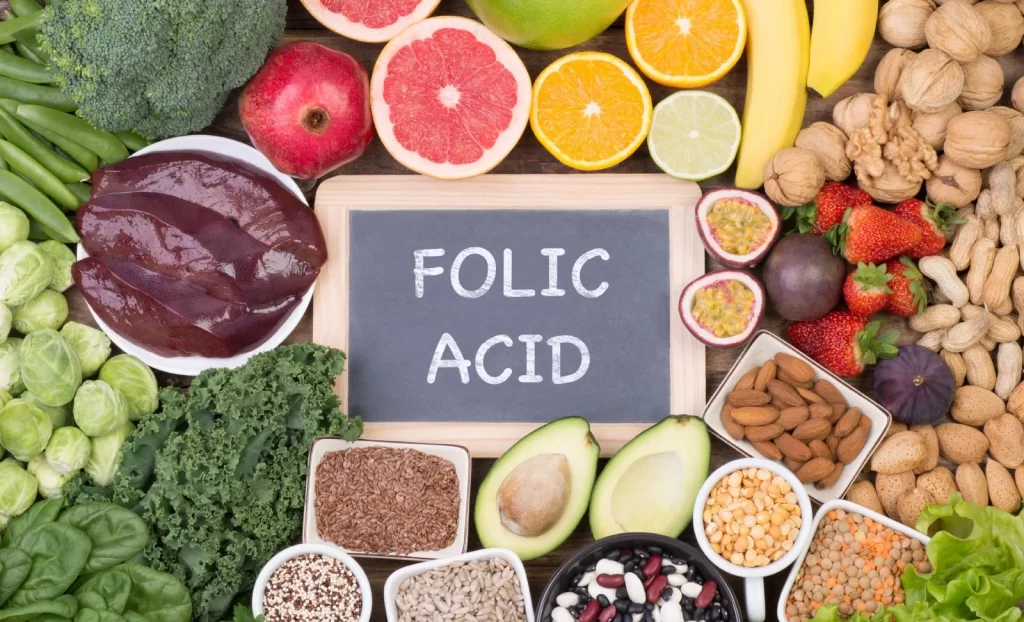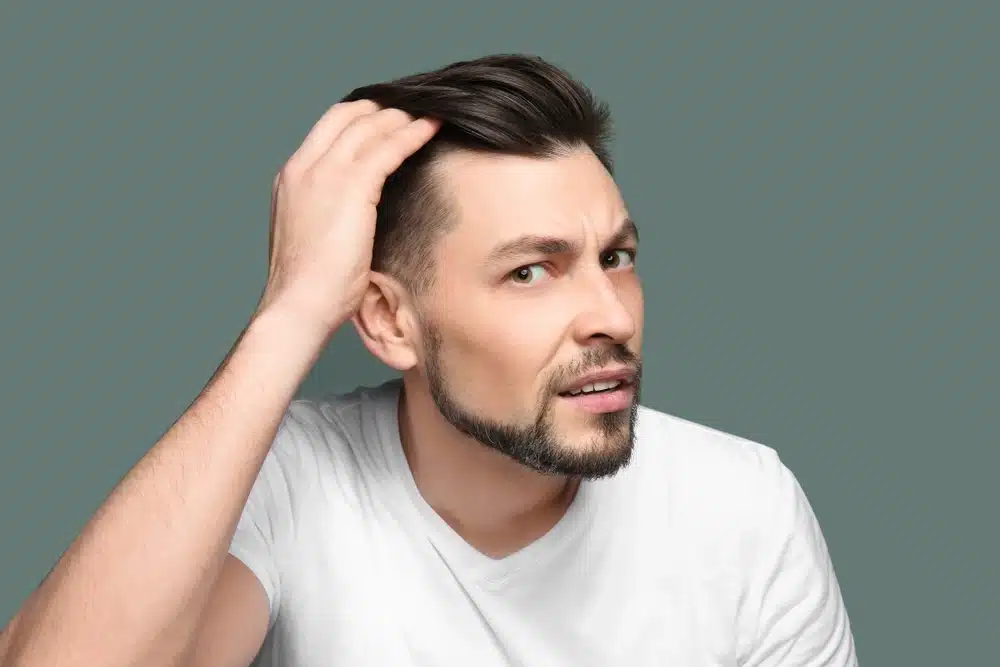Many people find that healthy hair doesn’t last a lifetime. Over time, it’s common to see hair falling out, with some people experiencing premature greying and hair loss. It can be quite upsetting to deal with, especially considering hair is so closely linked to identity and self-confidence. Good news: hair loss can be reversible in many cases.
If you have noticed hair loss or thinning, you’ve likely considered whether a nutritional deficiency is the root cause. One common deficiency that leads to hair loss is folic acid, and by taking a folic acid supplement, you could see hair regrowth before long.
Folic Acid: What Exactly is it?
Folic acid – also known as vitamin B9, is a necessary vitamin that contributes to healthy red blood cells. While it is found in many foods, you can also find a synthetic version of this vitamin in pills, allowing you to top up if you are deficient in it. The question is, does folic acid help hair growth?
Is Folic Acid Good for Hair? Folic Acid Benefits for Hair
Yes – taking folic acid for hair loss can be beneficial, assuming you are deficient in it. Nutrition and hair health are intrinsically linked. If you are deficient in a certain mineral or vitamin, you are more likely to experience hair loss and thinning. That also means that topping up those vitamins and minerals means reversing that hair loss.
Keep in mind that while many people experience healthier and fuller hair after taking folic acid, that won’t be the case if you already consume enough of it in your diet!
Folic Acid Deficiency Symptoms
So, are you deficient in folic acid? Is folic acid the root cause of your thinning hair? Here are the symptoms of a folic acid deficiency – if you tick off more than a couple, it’s definitely worth booking an appointment with your doctor to get a blood test done.
- Frequent Headaches
- Shortness of Breath
- Brittle hair and nails
- Loss of Appetite
- Extreme Fatigue
- Feeling Very Weak
- Vision Problems
- A Sore, Red Tongue
- Anxiety and Depression
- Rapid Heartrate
- Pale Skin
- Weight Loss
How Common is a Folic Acid Deficiency?
Folic acid deficiencies are very common, particularly in women. One study performed in Switzerland showed that 2.8% of pregnant women were deficient in folic acid, whereas 19.9% of women at reproductive age were deficient. [1]
How to Take Folic Acid for Hair Growth
The easiest way to take folic acid for hair growth is in supplement form. There are many brands out there that offer a folic acid supplement, so you have plenty of choice. In terms of how often you should take them, it’s usually once a day, but always read the instruction label before consuming. The recommended amount of folic acid per day is 400mg.
What Foods Naturally Contain Folic Acid?
Do you not enjoy taking supplements but want to increase your folic acid intake? If you suspect you have a folate deficiency (need folic acid) in your diet, you can avoid taking supplements by eating more food which includes folic acid – these are the foods you’ll want to eat more of.
- Nuts
- Beans
- Spinach
- Asparagus
- Broccoli
- Whole Grains
- Liver
- Grapefruit and other citrus fruits
- Bananas
- Avocado
- Eggs
As you can see, there are plenty of delicious, nutritious foods that are high in folic acid – by incorporating more of these foods into your diet, you may help your hair grow healthier.
Other Benefits of Taking Folic Acid
If you have a folic acid deficiency, you’ll experience more benefits than restoring healthy hair. Here are some of them:
- Healthy Blood Cells
- More Energy
- Reduced Risk of Heart Disease
- The Repair of DNA
- Better Brain Health
- Preventing Birth Defects
Women trying for a baby are often told to take folic acid before they’ve even gotten pregnant, with most doctors instructing them to take 400mg of folic acid as a prenatal vitamin each day from before pregnancy right up until they are twelve weeks pregnant. The reason for this is that the first twelve weeks of pregnancy is when the baby’s internal organs begin developing, and taking folic acid can help ensure this all happens properly, reducing the risk of birth defects. So, if you’re a pregnant woman in your early weeks of pregnancy, you should definitely consider taking folic acid, whether you have hair loss or not!
What Other Nutritional Deficiencies Cause Hair Loss?
It’s not just a folic acid deficiency that can cause hair loss – other deficiencies can lead to your hair falling out, with many nutritional deficiencies impacting both hair growth and hair structure. [2] Here are some other deficiencies that may lead to your hair thinning or falling out:
- Vitamin B12
- Vitamin D
- Biotin
- Selenium
- Iron
If you are deficient in any of these, that might be the cause of your hair loss. It’s always worth getting checked by your doctor if you think you have any kind of deficiency – it’s better to know for sure than to guess!
Will Folic Acid Help Your Hair Grow if You Don’t Have a Deficiency?
Probably not. There is currently no evidence to show that taking folic acid has any effect on your hair if you do not have a deficiency in this vitamin. If you don’t have a folic acid deficiency and you’re experiencing hair loss – more than the average of 50-100 hairs per day – then it’s worth looking into other causes of hair thinning and a different hair loss treatment.
The Side Effects of Taking Too Much Folic Acid
It is not worth taking folic acid if you don’t have a deficiency. Not only will you experience no benefits, but there are even adverse effects you may suffer from if you take too much of this vitamin. Here are the potential side effects:
- A Disturbed Sleep Pattern
- Loss of Appetite
- A Bad Taste in Your Mouth
- Nausea
- Flatulence
- Confusion
- Upset Stomach
- Changes in Behaviour
- Mental Decline
As you can see, some of these side effects are quite serious, which is why it’s important to avoid taking folic acid unless you actually need it.
Other Hair Loss Treatments
Is using folic acid for hair loss not working? Don’t worry – other solutions and treatments can help you enjoy a full head of locks once more.
Other Vitamins
As we have mentioned, there are other vitamin deficiencies that may contribute to hair loss (such as Vitamin D and biotin). In this case, you can take these as supplements as a hair loss treatment.
Minoxidil
Minoxidil is an over-the-counter medication that both men and women can take to treat hair loss. It’s usually applied topically twice a day and can stimulate hair growth, with many people – especially men – experiencing excellent results when used continuously.
Finasteride
Finasteride is another medication that can stimulate hair growth. This one is typically taken orally and is only prescribed to men. For it to work, you must take finasteride daily (stopping the medication will cause your hair to fall once more).
Low-Level Laser Therapy
A popular method for hair restoration is low-level laser therapy, which involves using a low-level laser to stimulate hair growth. While there isn’t much evidence of this working, many patients experience good results afterwards. You can even use some low-level laser therapy products in the comfort of your home.
Hair Transplants
Hair transplants have been around for many decades now. These days, they are natural and non-invasive, allowing you to go home on the same day as the treatment. The FUE hair transplant is particularly effective, as it creates a natural look using individual grafts of hair follicles. As a result, you experience natural hair growth in the area that was previously balding/thinning.
Can Anyone Get a Hair Transplant?
Unfortunately, no. There are some boxes you’ll need to tick to be able to get a hair transplant. For example, most candidates should be over the age of 30 and under 70. Typically, though, the best age to get a hair transplant is between 30-40 years.
Other factors that impact whether you’re a good candidate for a hair transplant include your overall health, how much hair loss you’ve suffered, and the health of your scalp. [3] If you’re unsure whether you’re a good candidate, you can discuss this during a consultation.
Folic Acid and Hair Growth: In Summary
Hopefully, we have answered the question, “Does folic acid help with hair growth?”. While folic acid doesn’t have any direct impact on the health of your hair, being deficient in this vitamin may cause your hair to fall out, so it’s best to get checked by a doctor. Luckily, there are other hair loss solutions if folic acid isn’t to blame.
At Harley Street Hair Clinic, we offer state-of-the-art hair restoration solutions to our clients so you can enjoy a full head of hair. If you want to regain your confidence after experiencing hair loss, get in touch to get the ball rolling. Our results are completely natural, and our talented team can point you in the right direction.
Sources:
- Inadequate Status and Low Awareness of Folate in Switzerland—A Call to Strengthen Public Health Measures to Ensure Sufficient Intakes
- Diet and hair loss: effects of nutrient deficiency and supplement use
- Is Every Patient of Hair Loss a Candidate for Hair Transplant?—Deciding Surgical Candidacy in Pattern Hair Loss




